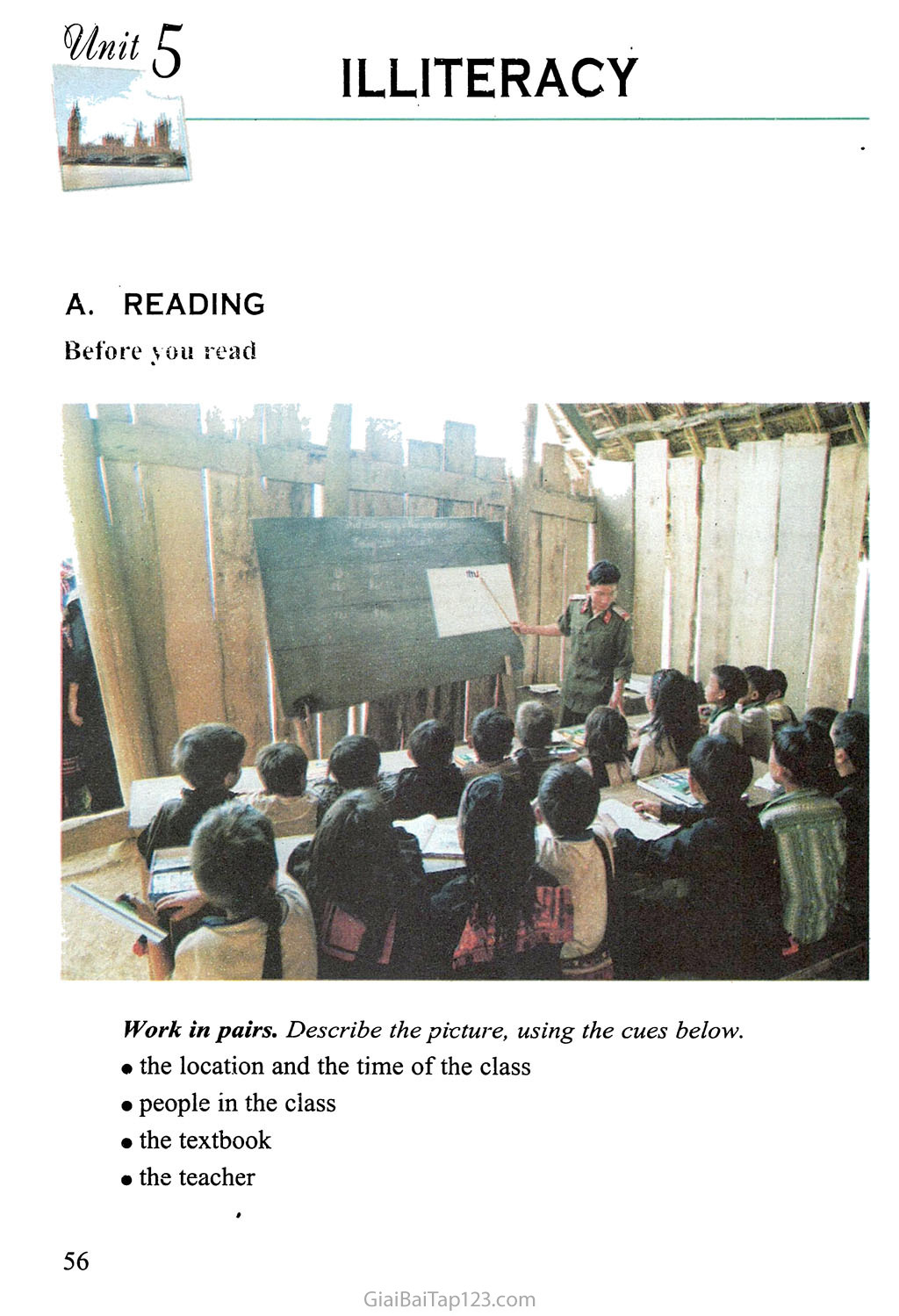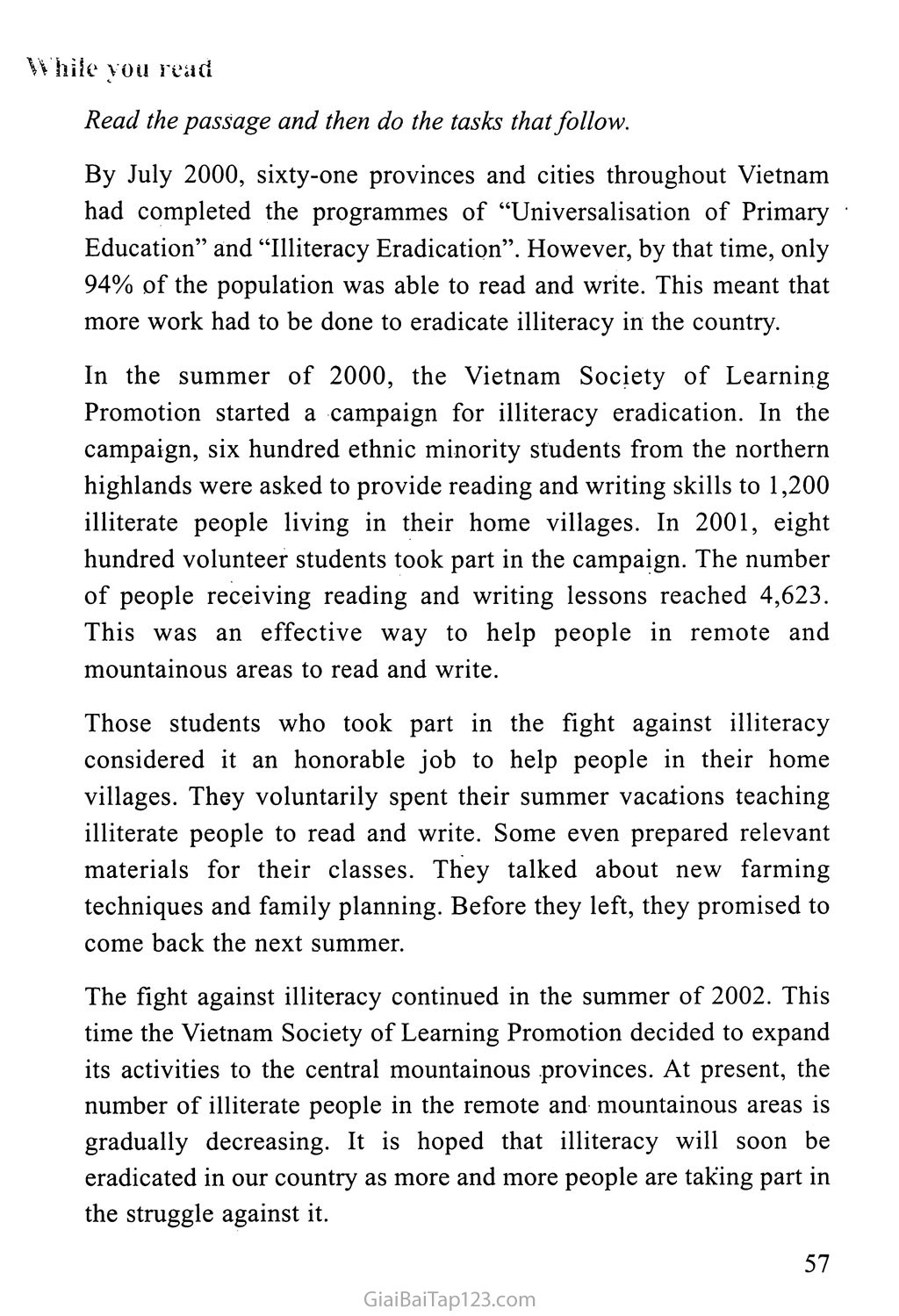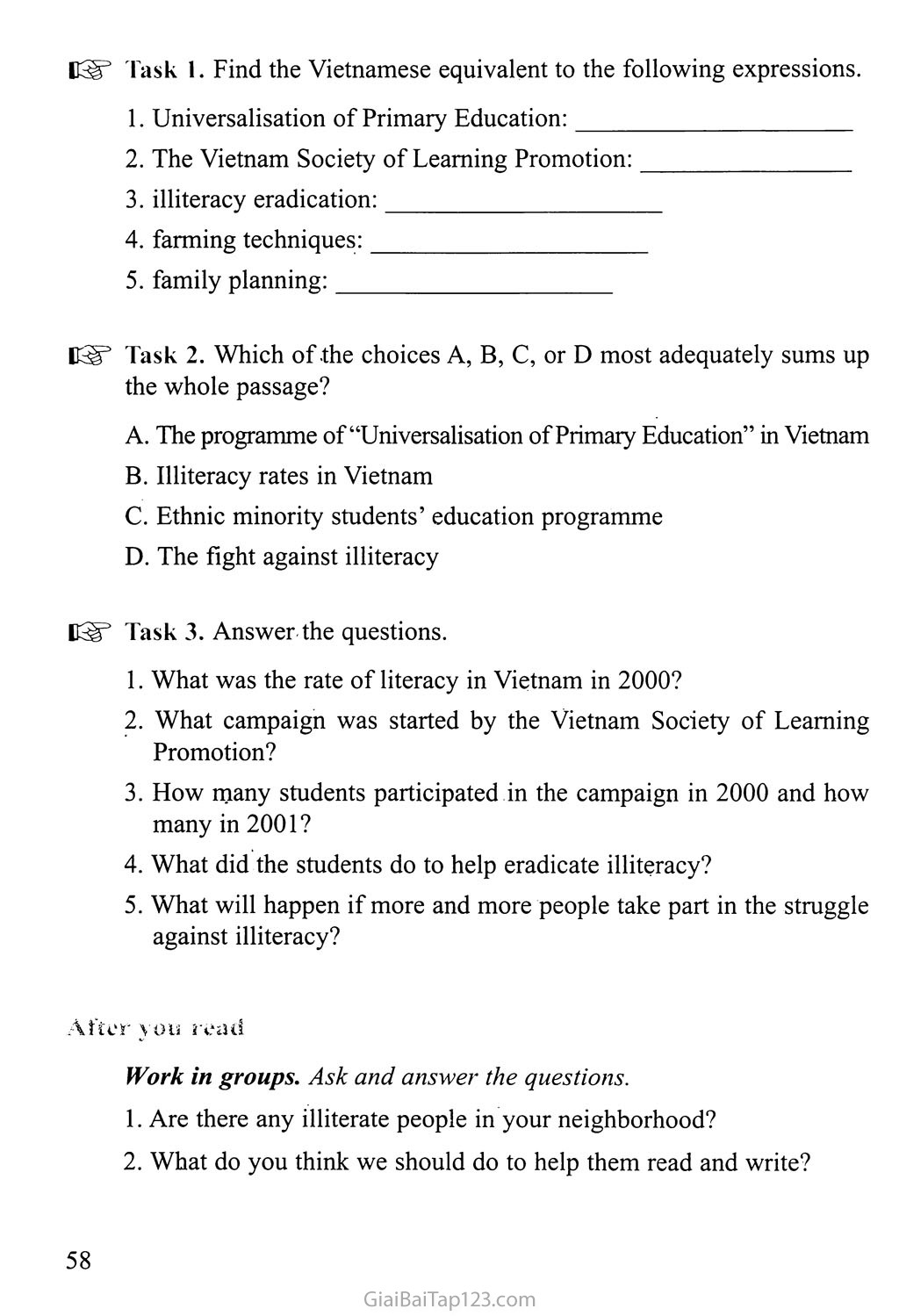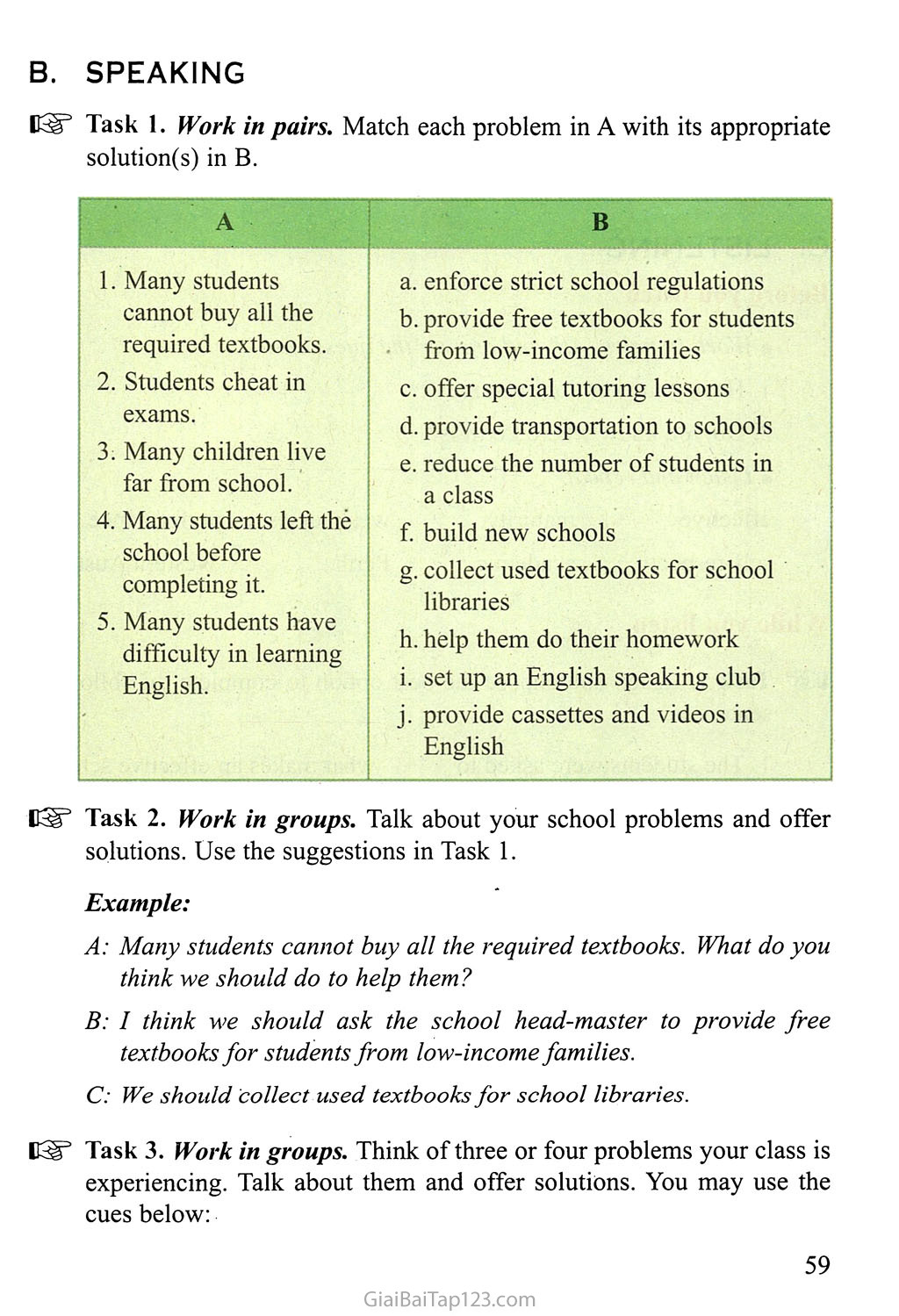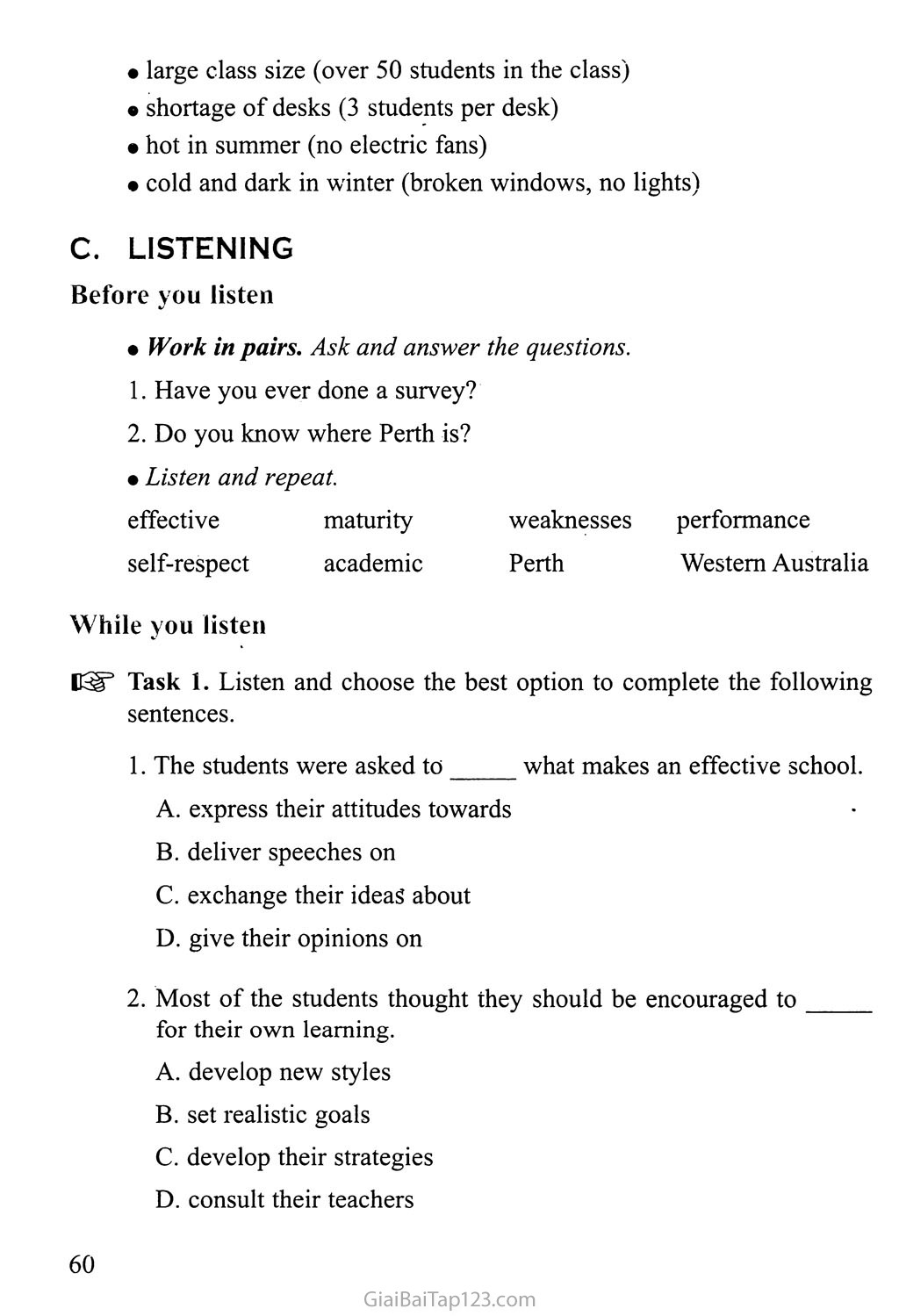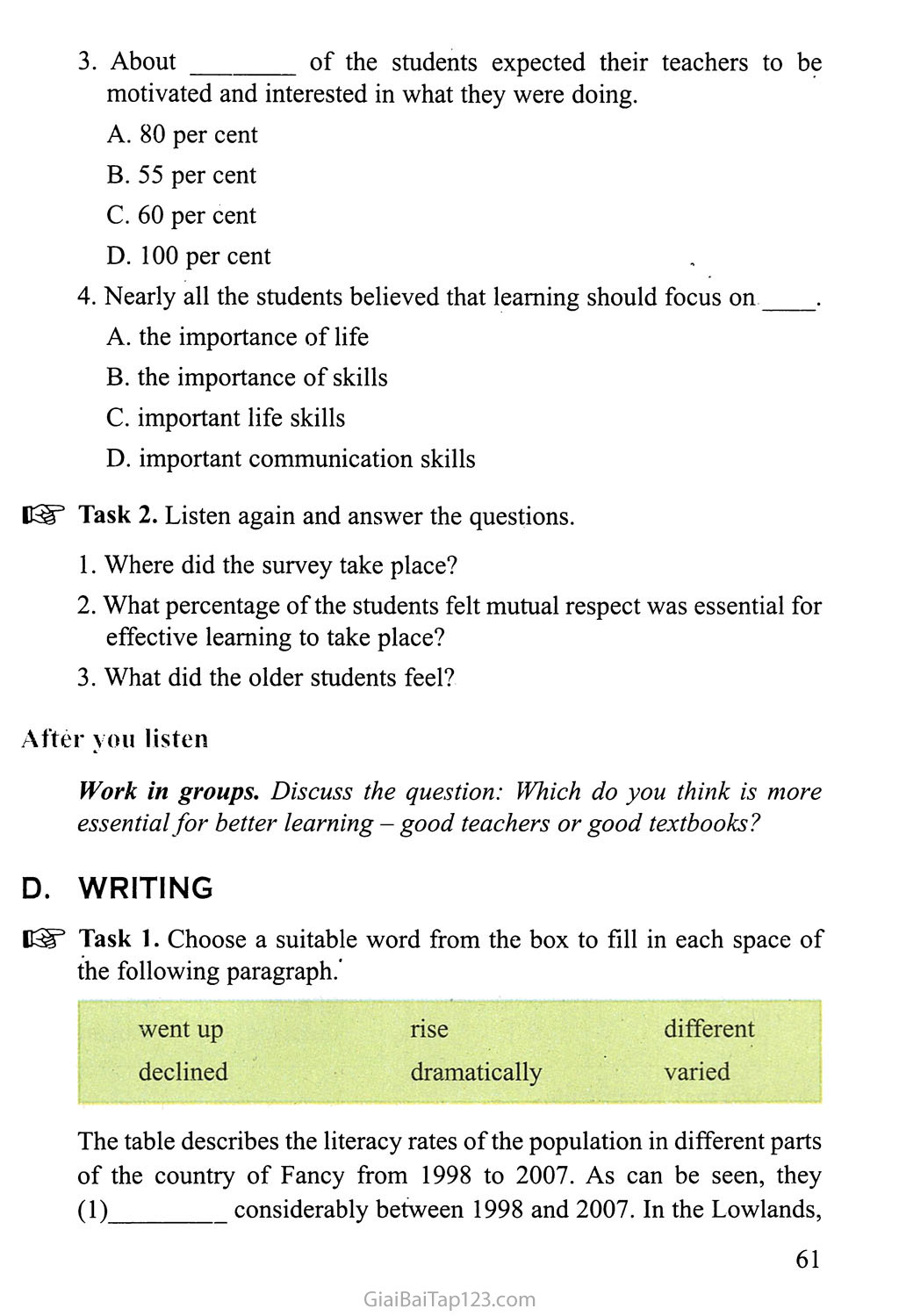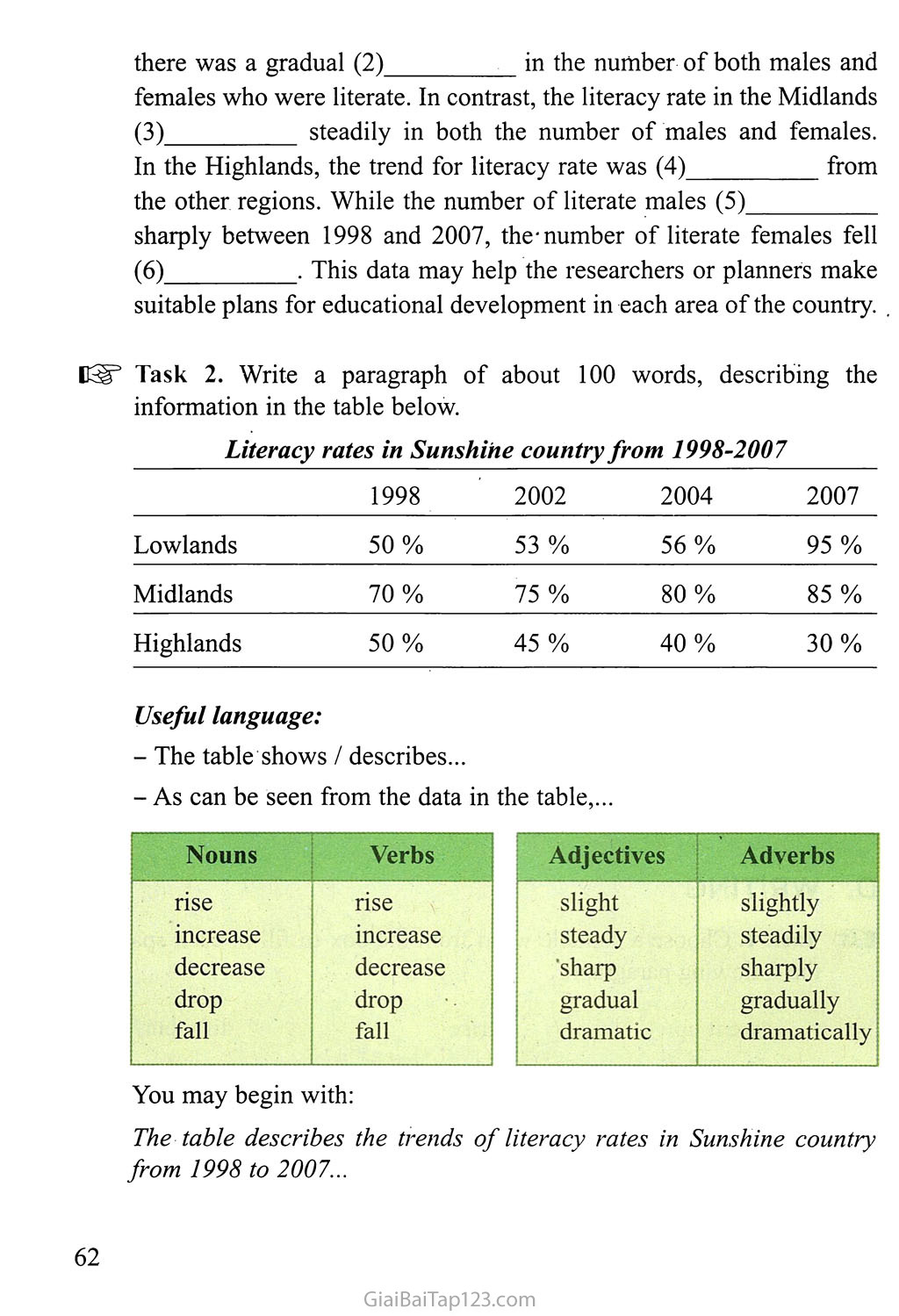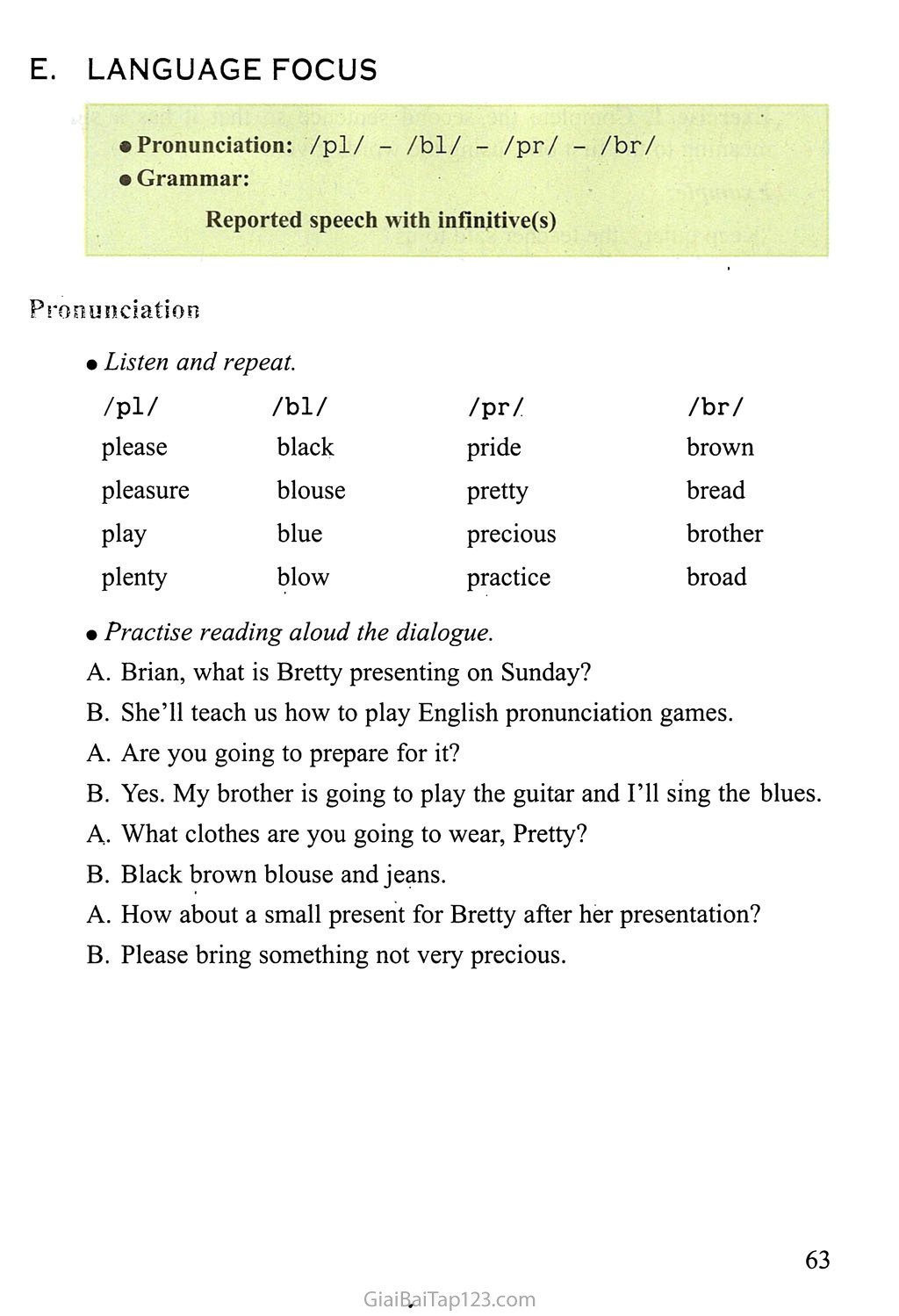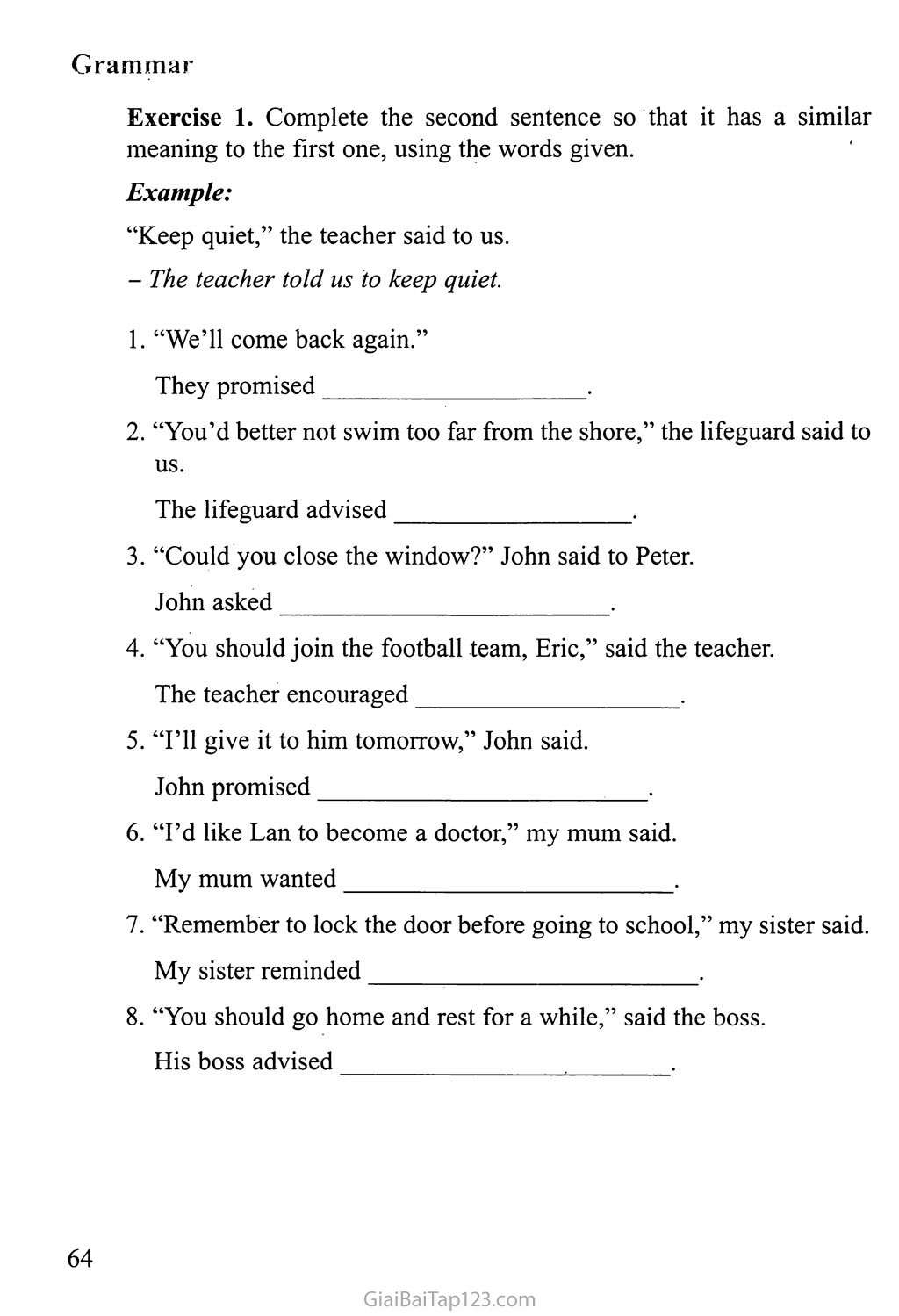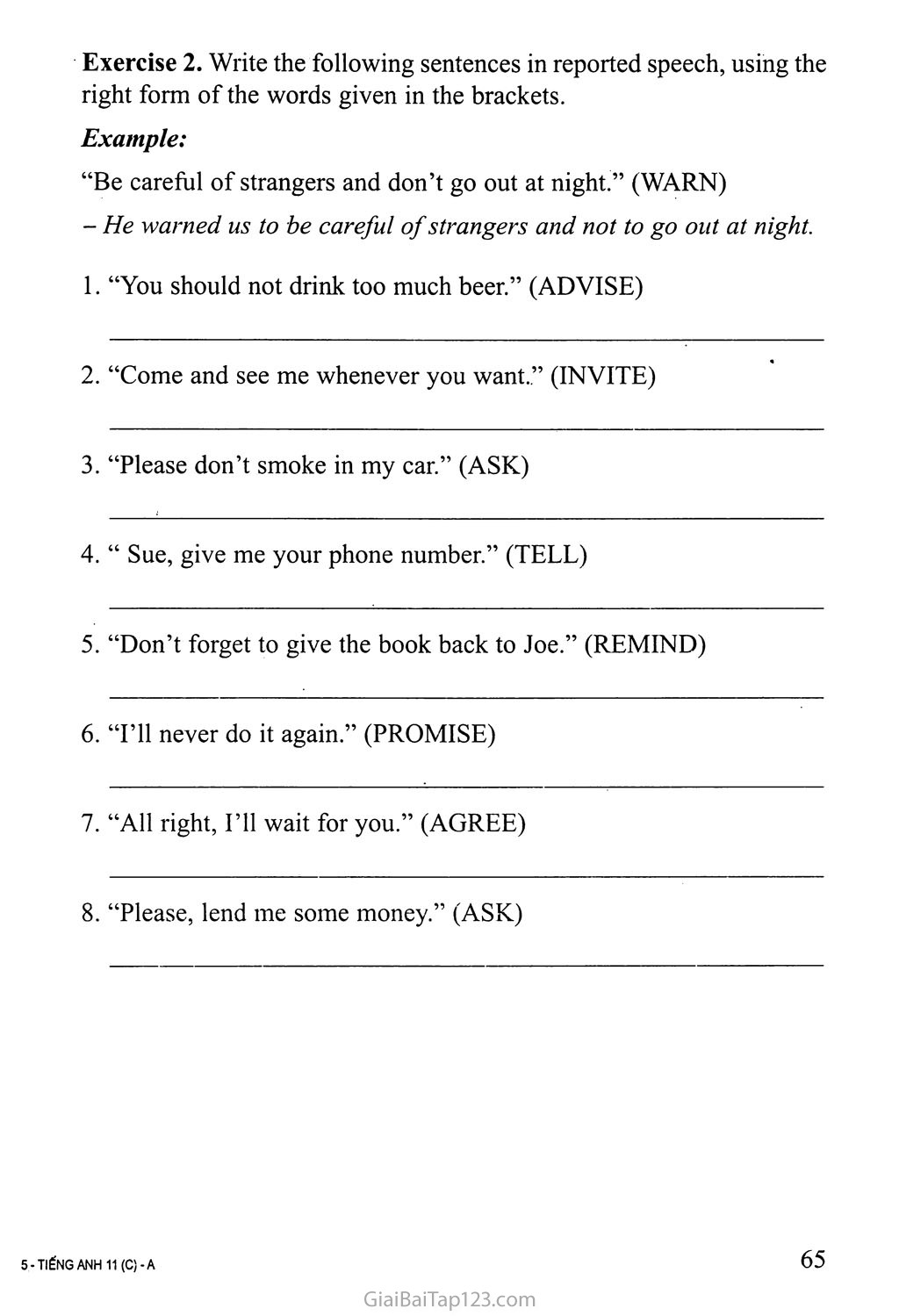SGK Tiếng Anh 11 - Unit 5: ILLITERACY
° ILLITERACY A. READING Before you read Work in pairs. Describe the picture, using the cues below. the location and the time of the class people in the class the textbook the teacher While you read Read the passage and then do the tasks that follow. By July 2000, sixty-one provinces and cities throughout Vietnam had completed the programmes of “Universalisation of Primary Education” and “Illiteracy Eradication”. However, by that time, only 94% of the population was able to read and write. This meant that more work had to be done to eradicate illiteracy in the country. In the summer of 2000, the Vietnam Society of Learning Promotion started a campaign for illiteracy eradication. In the campaign, six hundred ethnic minority students from the northern highlands were asked to provide reading and writing skills to 1,200 illiterate people living in their home villages. In 2001, eight hundred volunteer students took part in the campaign. The number of people receiving reading and writing lessons reached 4,623. This was an effective way to help people in remote and mountainous areas to read and write. Those students who took part in the fight against illiteracy considered it an honorable job to help people in their home villages. They voluntarily spent their summer vacations teaching illiterate people to read and write. Some even prepared relevant materials for their classes. They talked about new farming techniques and family planning. Before they left, they promised to come back the next summer. The fight against illiteracy continued in the summer of 2002. This time the Vietnam Society of Learning Promotion decided to expand its activities to the central mountainous provinces. At present, the number of illiterate people in the remote and mountainous areas is gradually decreasing. It is hoped that illiteracy will soon be eradicated in our country as more and more people are taking part in the struggle against it. Kir Task 1. Find the Vietnamese equivalent to the following expressions. Universalisation of Primary Education: The Vietnam Society of Learning Promotion: illiteracy eradication: farming techniques: family planning: CdlT Task 2. Which of .the choices A, B, c, or D most adequately sums up the whole passage? The programme of “Universalisation of Primary Education” in Vietnam Illiteracy rates in Vietnam Ethnic minority students’ education programme D. The fight against illiteracy USsT Task 3. Answer the questions. What was the rate of literacy in Vietnam in 2000? What campaign was started by the Vietnam Society of Learning Promotion? How many students participated in the campaign in 2000 and how many in 2001 ? What did the students do to help eradicate illiteracy? What will happen if more and more people take part in the struggle against illiteracy? After you read Work in groups. Ask and answer the questions. Are there any illiterate people in your neighborhood? What do you think we should do to help them read and write? B. SPEAKING IW’ Task 1. Work in pairs. Match each problem in A with its appropriate solution(s) in B. 1. Many students cannot buy all the required textbooks. Students cheat in exams. Many children live far from school. Many students left thẻ school before completing it. Many students have difficulty in learning English. B enforce strict school regulations provide free textbooks for students from low-income families offer special tutoring lessons provide transportation to schools reduce the number of students in a class build new schools collect used textbooks for school libraries help them do their homework set up an English speaking club provide cassettes and videos in English Task 2. Work in groups. Talk about your school problems and offer solutions. Use the suggestions in Task 1. Example: A: Many students cannot buy all the required textbooks. What do you think we should do to help them? B: I think we should ask the school head-master to provide free textbooks for students from low-income families. C: We should collect used textbooks for school libraries. enT Task 3. Work in groups. Think of three or four problems your class is experiencing. Talk about them and offer solutions. You may use the cues below: large class size (over 50 students in the class) shortage of desks (3 students per desk) hot in summer (no electric fans) cold and dark in winter (broken windows, no lights) c. LISTENING Before you listen Work in pairs. Ask and answer the questions. Have you ever done a survey? Do you know where Perth is? Listen and repeat. effective maturity weaknesses performance self-respect academic Perth Western Australia While you listen dr Task 1. Listen and choose the best option to complete the following sentences. The students were asked to what makes an effective school. express their attitudes towards deliver speeches on c. exchange their ideas' about D. give their opinions on Most of the students thought they should be encouraged to for their own learning. develop new styles set realistic goals c. develop their strategies D. consult their teachers About ' of the students expected their teachers to be motivated and interested in what they were doing. 80 per cent 55 per cent c. 60 per cent D. 100 per cent Nearly all the students believed that learning should focus on . the importance of life the importance of skills c. important life skills D. important communication skills dr Task 2. Listen again and answer the questions. Where did the survey take place? What percentage of the students felt mutual respect was essential for effective learning to take place? What did the older students feel? After you listen Work in groups. Discuss the question: Which do you think is more essential for better learning — good teachers or good textbooks? D. WRITING dr Task 1. Choose a suitable word from the box to fill in each space of the following paragraph.’ went up rise different declined dramatically varied The table describes the literacy rates of the population in different parts of the country of Fancy from 1998 to 2007. As can be seen, they (1) considerably between 1998 and 2007. In the Lowlands, there was a gradual (2) in the number of both males and females who were literate. In contrast, the literacy rate in the Midlands (3) steadily in both the number of males and females. In the Highlands, the trend for literacy rate was (4) from the other regions. While the number of literate males (5) sharply between 1998 and 2007, the-number of literate females fell (6) . This data may help the researchers or planners make suitable plans for educational development in each area of the country. / DTUr5 Task 2. Write a paragraph of about 100 words, describing the information in the table below. Literacy rates in Sunshine country from 1998-2007 1998 2002 2004 2007 Lowlands 50% 53 % 56% 95 % Midlands 70% 75 % 80% 85 % Highlands 50% 45 % 40% 30% Useful language: The table shows / describes... As can be seen from the data in the table,... p— Nouns Verbs Adjectives Adverbs rise rise slight slightly increase increase steady steadily decrease decrease 'sharp sharply drop drop gradual gradually fall fall dramatic dramatically You may begin with: The table describes the trends of literacy rates in Sunshine country from 1998 to 2007... E. LANGUAGE FOCUS Pronunciation: /pl/ - /bl/ - /pr/ - /br/ Grammar: Reported speech with infinitive(s) Pronunciation • Listen and repeat. /pl/ /bl/ /pr/ /br/ please black pride brown pleasure blouse pretty bread play blue precious brother plenty blow practice broad • Practise reading aloud the dialogue. Brian, what is Bretty presenting on Sunday? She’ll teach US how to play English pronunciation games. Are you going to prepare for it? Yes. My brother is going to play the guitar and I’ll sing the blues. What clothes are you going to wear, Pretty? Black brown blouse and jeans. How about a small present for Bretty after her presentation? Please bring something not very precious. Grammar Exercise 1. Complete the second sentence so that it has a similar meaning to the first one, using the words given. Example: “Keep quiet,” the teacher said to US. - The teacher told US to keep quiet. “We’ll come back again.” They promised “You’d better not swim too far from the shore,” the lifeguard said to us. Exercise 2. Write the following sentences in reported speech, using the right form of the words given in the brackets. Example: “Be careful of strangers and don’t go out at night.” (WARN) - He warned US to be careful of strangers and not to go out at night. “You should not drink too much beer.” (ADVISE) “Come and see me whenever you want.” (INVITE) “Please don’t smoke in my car.” (ASK) “ Sue, give me your phone number.” (TELL) “Don’t forget to give the book back to Joe.” (REMIND) “I’ll never do it again.” (PROMISE) “All right, I’ll wait for you.” (AGREE) “Please, lend me some money.” (ASK)

